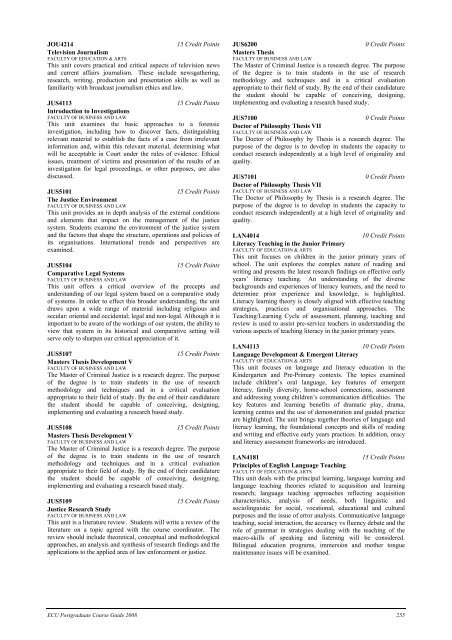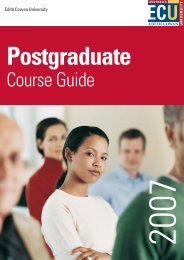Postgraduate - Edith Cowan University
Postgraduate - Edith Cowan University
Postgraduate - Edith Cowan University
You also want an ePaper? Increase the reach of your titles
YUMPU automatically turns print PDFs into web optimized ePapers that Google loves.
JOU4214 15 Credit Points<br />
Television Journalism<br />
FACULTY OF EDUCATION & ARTS<br />
This unit covers practical and critical aspects of television news<br />
and current affairs journalism. These include newsgathering,<br />
research, writing, production and presentation skills as well as<br />
familiarity with broadcast journalism ethics and law.<br />
JUS4113 15 Credit Points<br />
Introduction to Investigations<br />
FACULTY OF BUSINESS AND LAW<br />
This unit examines the basic approaches to a forensic<br />
investigation, including how to discover facts, distinguishing<br />
relevant material to establish the facts of a case from irrelevant<br />
information and, within this relevant material, determining what<br />
will be acceptable in Court under the rules of evidence. Ethical<br />
issues, treatment of victims and presentation of the results of an<br />
investigation for legal proceedings, or other purposes, are also<br />
discussed.<br />
JUS5101 15 Credit Points<br />
The Justice Environment<br />
FACULTY OF BUSINESS AND LAW<br />
This unit provides an in depth analysis of the external conditions<br />
and elements that impact on the management of the justice<br />
system. Students examine the environment of the justice system<br />
and the factors that shape the structure, operations and policies of<br />
its organisations. International trends and perspectives are<br />
examined.<br />
JUS5104 15 Credit Points<br />
Comparative Legal Systems<br />
FACULTY OF BUSINESS AND LAW<br />
This unit offers a critical overview of the precepts and<br />
understanding of our legal system based on a comparative study<br />
of systems. In order to effect this broader understanding, the unit<br />
draws upon a wide range of material including religious and<br />
secular: oriental and occidental; legal and non-legal. Although it is<br />
important to be aware of the workings of our system, the ability to<br />
view that system in its historical and comparative setting will<br />
serve only to sharpen our critical appreciation of it.<br />
JUS5107 15 Credit Points<br />
Masters Thesis Development V<br />
FACULTY OF BUSINESS AND LAW<br />
The Master of Criminal Justice is a research degree. The purpose<br />
of the degree is to train students in the use of research<br />
methodology and techniques and in a critical evaluation<br />
appropriate to their field of study. By the end of their candidature<br />
the student should be capable of conceiving, designing,<br />
implementing and evaluating a research based study.<br />
JUS5108 15 Credit Points<br />
Masters Thesis Development V<br />
FACULTY OF BUSINESS AND LAW<br />
The Master of Criminal Justice is a research degree. The purpose<br />
of the degree is to train students in the use of research<br />
methodology and techniques and in a critical evaluation<br />
appropriate to their field of study. By the end of their candidature<br />
the student should be capable of conceiving, designing,<br />
implementing and evaluating a research based study.<br />
JUS5109 15 Credit Points<br />
Justice Research Study<br />
FACULTY OF BUSINESS AND LAW<br />
This unit is a literature review. Students will write a review of the<br />
literature on a topic agreed with the course coordinator. The<br />
review should include theoretical, conceptual and methodological<br />
approaches, an analysis and synthesis of research findings and the<br />
applications to the applied area of law enforcement or justice.<br />
JUS6200 0 Credit Points<br />
Masters Thesis<br />
FACULTY OF BUSINESS AND LAW<br />
The Master of Criminal Justice is a research degree. The purpose<br />
of the degree is to train students in the use of research<br />
methodology and techniques and in a critical evaluation<br />
appropriate to their field of study. By the end of their candidature<br />
the student should be capable of conceiving, designing,<br />
implementing and evaluating a research based study.<br />
JUS7100 0 Credit Points<br />
Doctor of Philosophy Thesis VII<br />
FACULTY OF BUSINESS AND LAW<br />
The Doctor of Philosophy by Thesis is a research degree. The<br />
purpose of the degree is to develop in students the capacity to<br />
conduct research independently at a high level of originality and<br />
quality.<br />
JUS7101 0 Credit Points<br />
Doctor of Philosophy Thesis VII<br />
FACULTY OF BUSINESS AND LAW<br />
The Doctor of Philosophy by Thesis is a research degree. The<br />
purpose of the degree is to develop in students the capacity to<br />
conduct research independently at a high level of originality and<br />
quality.<br />
LAN4014 10 Credit Points<br />
Literacy Teaching in the Junior Primary<br />
FACULTY OF EDUCATION & ARTS<br />
This unit focuses on children in the junior primary years of<br />
school. The unit explores the complex nature of reading and<br />
writing and presents the latest research findings on effective early<br />
years’ literacy teaching. An understanding of the diverse<br />
backgrounds and experiences of literacy learners, and the need to<br />
determine prior experience and knowledge, is highlighted.<br />
Literacy learning theory is closely aligned with effective teaching<br />
strategies, practices and organisational approaches. The<br />
Teaching/Learning Cycle of assessment, planning, teaching and<br />
review is used to assist pre-service teachers in understanding the<br />
various aspects of teaching literacy in the junior primary years.<br />
LAN4113 10 Credit Points<br />
Language Development & Emergent Literacy<br />
FACULTY OF EDUCATION & ARTS<br />
This unit focuses on language and literacy education in the<br />
Kindergarten and Pre-Primary contexts. The topics examined<br />
include children’s oral language, key features of emergent<br />
literacy, family diversity, home-school connections, assessment<br />
and addressing young children’s communication difficulties. The<br />
key features and learning benefits of dramatic play, drama,<br />
learning centres and the use of demonstration and guided practice<br />
are highlighted. The unit brings together theories of language and<br />
literacy learning, the foundational concepts and skills of reading<br />
and writing and effective early years practices. In addition, oracy<br />
and literacy assessment frameworks are introduced.<br />
LAN4181 15 Credit Points<br />
Principles of English Language Teaching<br />
FACULTY OF EDUCATION & ARTS<br />
This unit deals with the principal learning, language learning and<br />
language teaching theories related to acquisition and learning<br />
research; language teaching approaches reflecting acquisition<br />
characteristics, analysis of needs, both linguistic and<br />
sociolinguistic for social, vocational, educational and cultural<br />
purposes and the issue of error analysis. Communicative language<br />
teaching, social interaction, the accuracy vs fluency debate and the<br />
role of grammar in strategies dealing with the teaching of the<br />
macro-skills of speaking and listening will be considered.<br />
Bilingual education programs, immersion and mother tongue<br />
maintenance issues will be examined.<br />
ECU <strong>Postgraduate</strong> Course Guide 2008 255



